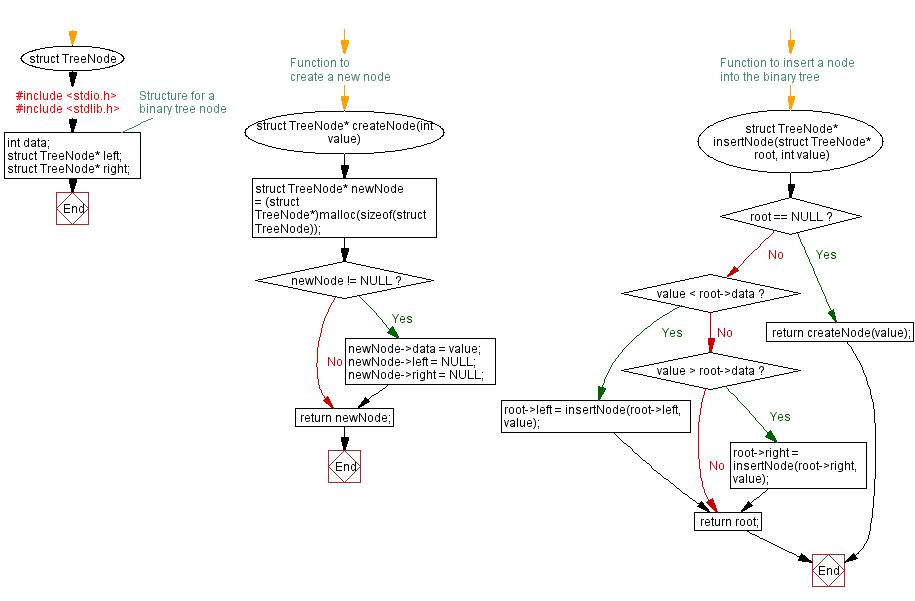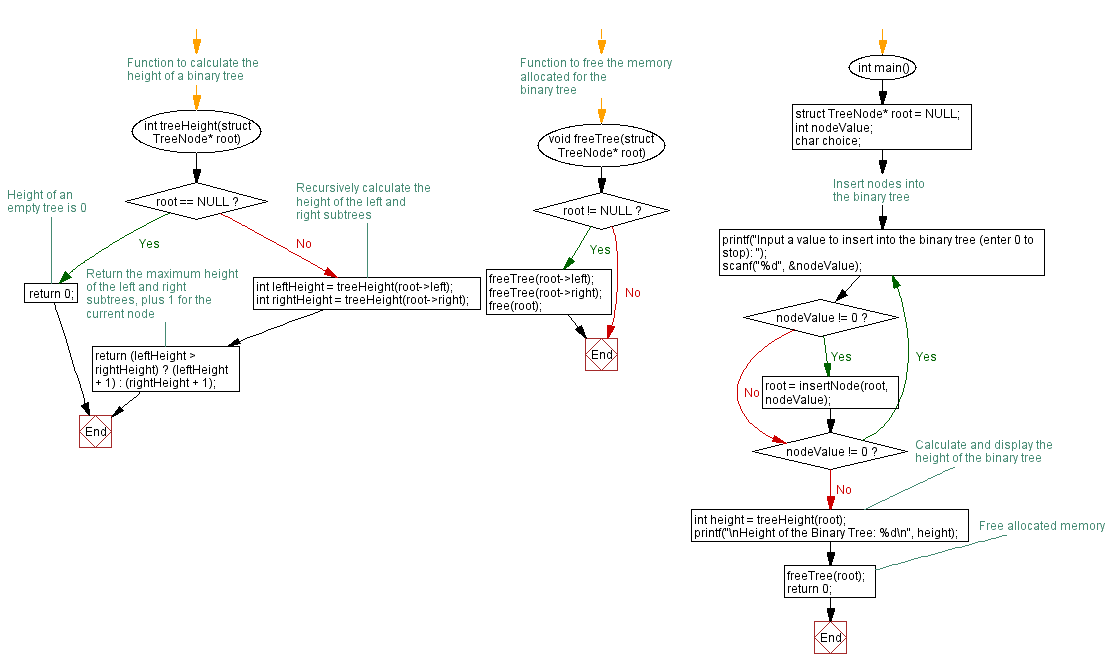C Program: Calculate height of Binary Tree with graceful handling
4. Binary Tree Height Calculation Challenges
Write a C program to calculate the height of a binary tree. Ensure the program handles empty trees gracefully.
Sample Solution:
C Code:
// Including necessary header files
#include <stdio.h>
#include <stdlib.h>
// Structure for a binary tree node
struct TreeNode {
int data;
struct TreeNode* left;
struct TreeNode* right;
};
// Function to create a new node
struct TreeNode* createNode(int value) {
struct TreeNode* newNode = (struct TreeNode*)malloc(sizeof(struct TreeNode));
if (newNode != NULL) {
newNode->data = value;
newNode->left = NULL;
newNode->right = NULL;
}
return newNode;
}
// Function to insert a node into the binary tree
struct TreeNode* insertNode(struct TreeNode* root, int value) {
if (root == NULL) {
return createNode(value);
}
if (value < root->data) {
root->left = insertNode(root->left, value);
} else if (value > root->data) {
root->right = insertNode(root->right, value);
}
return root;
}
// Function to calculate the height of a binary tree
int treeHeight(struct TreeNode* root) {
if (root == NULL) {
return 0; // Height of an empty tree is 0
}
// Recursively calculate the height of the left and right subtrees
int leftHeight = treeHeight(root->left);
int rightHeight = treeHeight(root->right);
// Return the maximum height of the left and right subtrees, plus 1 for the current node
return (leftHeight > rightHeight) ? (leftHeight + 1) : (rightHeight + 1);
}
// Function to free the memory allocated for the binary tree
void freeTree(struct TreeNode* root) {
if (root != NULL) {
freeTree(root->left);
freeTree(root->right);
free(root);
}
}
int main() {
struct TreeNode* root = NULL;
int nodeValue;
char choice;
// Insert nodes into the binary tree
do {
printf("Input a value to insert into the binary tree (enter 0 to stop): ");
scanf("%d", &nodeValue);
if (nodeValue != 0) {
root = insertNode(root, nodeValue);
}
} while (nodeValue != 0);
// Calculate and display the height of the binary tree
int height = treeHeight(root);
printf("\nHeight of the Binary Tree: %d\n", height);
// Free allocated memory
freeTree(root);
return 0;
}
Output:
Input a value to insert into the binary tree (enter 0 to stop): 45 Input a value to insert into the binary tree (enter 0 to stop): 18 Input a value to insert into the binary tree (enter 0 to stop): 12 Input a value to insert into the binary tree (enter 0 to stop): 8 Input a value to insert into the binary tree (enter 0 to stop): 4 Input a value to insert into the binary tree (enter 0 to stop): 0 Height of the Binary Tree: 5
Explanation:
In the exercise above,
- Structure Definition (struct TreeNode):
- Defines a structure for a binary tree node (TreeNode) with integer data, and pointers to the left and right children.
- Node Creation Function (createNode):
- Allocates memory for a new node and initializes its data and pointers.
- Node Insertion Function (insertNode):
- Inserts a new node into the binary tree while maintaining the binary search tree property.
- Tree Height Calculation Function (treeHeight):
- Recursively calculates and returns the height of the binary tree.
- Memory Deallocation Function (freeTree):
- Frees the memory allocated for the binary tree nodes.
- Main Function (main):
- Initializes the root of the binary tree to NULL.
- Allows the user to input values to insert into the binary tree until the user enters 0.
- Calls the treeHeight function to calculate and display the height of the binary tree.
- Frees the memory allocated for the binary tree.
Flowchart:


For more Practice: Solve these Related Problems:
- Write a C program to calculate the height of a binary tree iteratively using level order traversal.
- Write a C program to compute both the height and the total number of leaf nodes in a binary tree.
- Write a C program to determine the height of a skewed binary tree where each node only has one child.
- Write a C program to compute the diameter of a binary tree, which is the longest path between any two nodes.
Go to:
PREV : Binary Search Tree Insertion Extensions.
NEXT : Binary Tree Deletion Extensions.
C Programming Code Editor:
What is the difficulty level of this exercise?
Test your Programming skills with w3resource's quiz.
